Executive Summary
In discussions regarding the future of the Gaza Strip, Qatar has been suggested as a candidate for taking on a central role in rebuilding the Strip, either on its own or as part of a coalition of Arab states.
Placing the Gaza Strip under Qatari influence will degrade Israel’s strategic position and significantly restrict its leeway to act against its Gazan enemy. To support this claim, this paper will take a deep dive into the details, reviewing the different aspects of Qatar’s power, foreign relations, and goals.
The key to understanding Qatar, is to see it not as a regular Western state but rather as a family in possession of state power. The Al-Thani family rules Qatar, a small state in which only 11.6% of the 2.6 million residents are citizens. It is an extremely wealthy state, sharing the world’s largest gas field with Iran, and providing approximately a third of the world market’s liquified gas.
Qatar has positioned itself as a versatile player willing to cooperate with any party that can forward its interests. For Qatar, Saudi Arabia constitutes one of its primary challengers in terms of economics and spheres of influence, and the state’s increasing ties to Iran, Turkey, and the Muslim Brotherhood axis should be viewed through this prism. At the same time, Qatar safeguards itself by cooperating with the US and by hosting a massive American military presence, providing the American forces with a base for much of their action in Afghanistan and Iraq.
In the shadow of its economic power, Qatar has formed an international network of influence. It is a major energy provider; it owns Al-Jazeera, the most prominent Arabic media company, and it donates large sums of money to leading academic institutions around the globe, taking a hand in shaping their environment. It was recently revealed that Qatar bribed politicians and public figures with huge sums of money. In addition, Qatar purchases weapons and technology all around the West, and is the patron of Hamas, playing host to its leading members. In fact, Qatar has been hosting and assisting radical Islamists for decades, facilitating institutional antisemitism and disseminating Sheikh Yusuf al-Qaradawi’s teachings throughout the Arab world.
Considering the above, the geopolitical reality of Qatari dominance in Gaza can be outlined as follows:
A. The primary consequence of October 7 will be a strategic gain for Hamas, now empowered by state patronage.
B. Israel may find itself facing state power in any future and inevitable friction in the Gaza Strip. Such a dynamic is already playing out to a smaller degree with Jordan vis-à-vis the Temple Mount. The formal dominance of a powerful state in clearly bounded territory leads to serious challenges and will restrict Israel’s scope of action. In simple terms, Israel, before taking any military action or even applying economic pressure, will need to consider and assess the Qatari reaction across all its powers and affiliates, as well as other states’ reactions to Qatari displeasure.
C. Because of Qatar’s key role in the energy market, any friction in the Gaza Strip will bring on international pressure. Qatar provides around a third of the worlds’ natural liquified gas (LNG) and is projected to provide 40% by 2029. The importance of the Qatari gas trumped Saudi Arabia, the United Arab Emirates, Bahrain, and Egypt’s attempts to boycott trade with Qatar at the time of the blockade (2017-2020). Qatar took advantage of the blockade to develop its independence and leave OPEC. The war in Ukraine and the subsequent sanctions on Russia strengthened the importance of Qatari gas, and its export to Europe, the UK, Poland, and Germany has increased – Qatar provides close to 10% of the LNG import to the EU. Qatar has already displayed how it uses its gas as leverage – after the EU began investigating suspected Qatari bribes to European Members of Parliament, Qatar warned that the investigation may negatively impact the supply of gas.
D. The importance of the American military presence on Qatari soil may lead to US pressure on Israel to avoid all conflict. Israel may well voluntarily avoid such conflict during American military action in the Middle East.
E. Qatari dominance in the Gaza Strip may expand Turkey’s involvement in the area, considering the ideological and strategic pact between the two states.
F. Various elements in the Strip will be granted de-facto immunity from Israeli strikes or arrests due to their position as Qatari representatives.
It goes without saying that Israel must bring about a strategic defeat for the Gazans. The success of such will be indicated when Gaza no longer presents a threat to Israel, and when the state of Israel has free reign to act on its security needs in the Gaza Strip. Qatar, together with Hamas political leaders in Doha, may well hand the Gazan government to parties they have worked with in the past, namely, Hamas-affiliated parties. Qatar has adopted an openly anti-Israel (and antisemitic) line, even after the October 7 massacre, and should not be rewarded with a state-like entity on Israel’s border. Should Qatar become Gaza’s savior, its image as a sponsor of terrorism will be replaced by the image of a humanitarian actor, thus denying Israel one of its only points of leverage. Therefore, Israel must keep Qatar at arm’s length from any future administration of Gaza.




